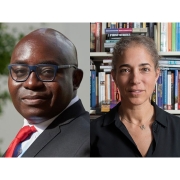Study Models How the Immune System Might Evolve to Conquer HIV
It has remained frustratingly difficult to develop a vaccine for HIV/AIDS, in part because the virus, once in our bodies, rapidly reproduces and evolves to escape being killed by the immune system.
“The viruses are constantly producing mutants that evade detection,” says Joshua Plotkin, professor of biology. “A single person with HIV may have millions of strains of the virus circulating in the body.”
Yet the body’s immune system can also evolve. Antibody-secreting B-cells compete among themselves to survive and proliferate depending on how well they bind to foreign invaders. They dynamically produce diverse types of antibodies during the course of an infection.
In a new paper in PLOS Genetics, Plotkin, along with postdoctoral researcher Jakub Otwinowski and Princeton University research scholar Armita Nourmohammad, mathematically modeled these dueling evolutionary processes to understand the conditions that influence how antibodies and viruses interact and adapt to one another over the course of a chronic infection.
Notably, the researchers considered the conditions under which the immune system gives rise to broadly neutralizing antibodies, which can defeat broad swaths of viral strains by targeting the most vital and immutable parts of the viral genome. Their findings, which suggest that presenting the immune system with a large diversity of viral antigens may be the best way to encourage the emergence of such potent antibodies, have implications for designing vaccines against HIV and other chronic infections.
“This isn’t a prescription for how to design an HIV vaccine,” Plotkin says, “but our work provides some quantitative guidance for how to prompt the immune system to elicit broadly neutralizing antibodies.”
Click here to read the full article.





